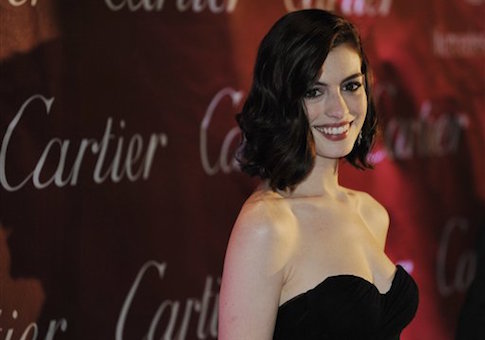Let’s be totally honest: The only legitimate reason to watch the Oscars is to see which couture gown America’s Sweetheart Anne Hathaway is wearing.
The Academy Awards are a social occasion, a big party. Let’s not pretend that the Oscars are any kind of objective, or even subjective, measure of the "best" films of the year. The Hollywood Reporter slaughtered that notion with their "brutally honest ballot" series. The ongoing THR feature is a horror show every year, mind you, but particularly dreadful was Wednesday’s ballot—offered by a "longtime" female member of the Academy’s "public relations branch."
Yes, Virginia, PR people are filmmakers too.
Our anonylass was the subject of much excoriation on Twitter for her comments about Selma, some of which were fair ("there’s no art to it") some less so (her crack about the cast wearing "I can’t breathe" shirts is the line that will launch a thousand think pieces). But it was her discussion of who she was, rather than whom she wasn’t, voting for that should disabuse you of any notion that the Oscars is an awards show worth taking seriously.
"I'm voting for [Birdman's] Michael Keaton because I love him and for a lot of reasons," our oh-so-brutal correspondent informs, "not the least of which is he seems like a completely sane person who lives in the middle of the country and works when he wants to work. I've loved every interview that he's done. He seems grateful, not particularly needy, and I don't know when he'll ever get another chance at this; the other nominees will."
Journos and critics scoffed at this flack’s hackery, but it’s not like they’re much better. Who can forget the (unheeded) warning shot fired at the Academy about the whiteness of this year’s show? Artistry be damned, we have quotas to fill!
Indeed, Selma "deserves to win," according to a Washington Post blogger, because the subject is so "historically important" and the "Academy owes her"—"her" being Ava DuVernay, the director "snubbed" for a nomination despite bringing an utterly competent, TV-movie-quality visual sensibility to Selma.
"Historical importance" is an interesting imperative when judging art. It’s why you’ve seen Harvey Weinstein engage in a thoroughly shameless playing of the rainbow card in an effort to win The Imitation Game a best picture trophy. Don’t even get me started on the idiotic arguments regarding the historical accuracy of this year’s best picture crop. Ever since The Brazilian Kid torpedoed Zero Dark Thirty’s Oscar hopes by arguing it was immoral to show terrorists coughing up intel after being roughed up, the studios have all developed miniature history departments focused solely on poking holes in the middling docudramas that so often comprise Oscar favorites.
No worries on the accuracy front for BOYHOOD IT TOOK 12 YEARS TO MAKE BOYHOOD, which served as the frontrunner for months. Indeed, when betting on this year’s Oscars opened, Boyhood was a 1 to 14 favorite—meaning you’d have to bet $14 to win a single buck. The critical smash has limped to the finish line, however, shocking Oscar prognosticators who, swooning over this naturalistic examination of a middle American family, forgot that there was a movie in the field paying homage to truly interesting folks: actors!
Don’t get me wrong: I like Birdman quite a bit. It’s an impressive piece of filmmaking, one that perfectly combines a distinctive visual trick—the 100-minute-long "single take" at the film’s center—with the dreamtime logic of the screenplay. It’s a film the likes of which never gets made anymore, Birdman suggests, because of all those icky superhero movies. How would we ever know that it’s impossible to get a mid-budget middlebrow movie made by a foreign director starring a bushel of non-A-listers off the ground without, um, Birdman?
The gurus of gold should have predicted Birdman’s emergence as best picture favorite—which it has to be, after winning awards from, basically, every guild. After all, this is a movie about the nobility of filmmaking, of trying to make something better, something lasting. Just as Argo was a movie about filmmaking solving the world’s most intractable problems and The Artist was a movie about filmmaking’s higher callings, Birdman is a movie about movies at their best.
Hollywood has never lacked for self-esteem, but the recent influx of cinema-focused cinema taking home trophies does make it seem as though we need to revise our definition of "Oscar bait." Oh, sure, Eddie Redmayne will win best actor despite the protestations of Vince Mancini and everyone else who is tired of "prestige" pictures in which a historical figure overcomes some sort of malady to change the world.
But when it comes to best picture, if you’re looking for Oscar gold you’re much better served making a movie about a movie, preferably a movie about a movie that either argues movies can change the world or that movies are a legitimate art form and must be treated as such.
If I sound like a curmudgeon … well, I am one. But allow me to channel our commander in chief and ask you to let me be clear: I love the Oscars! I love live-tweeting it (#ff @SonnyBunch!) and I love watching the red carpet and I love guessing who will win (Birdman, Linklater, Redmayne, Julianne Moore, J.K. Simmons, Patricia Arquette, Grand Budapest Hotel, and, I dunno, Whiplash?) and I love kvetching about the musical numbers and I love the in memoriam segment.
But most importantly I love seeing what Anne Hathaway’s got in store for us each and every Oscar Sunday. And that’s no more, and no less, important than keeping track of who goes home with the little, golden, meaningless man.
